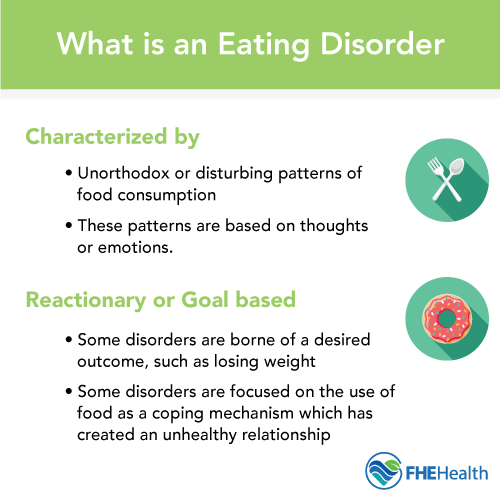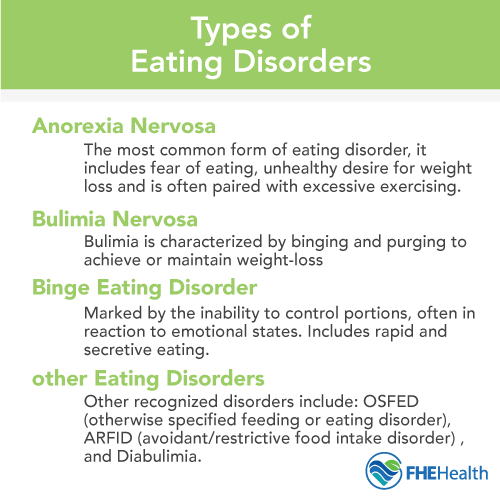For most people around the world, eating is enjoyable as well as necessary for survival. For others, however, it’s the source of deep emotional wounds. For around 2% of American adults, eating disorders dominate the normally pleasurable experience of a good meal.
Eating disorders come in numerous forms but are universally represented by an unhealthy approach to eating, including restrictive eating, overeating, and binging and purging behaviors. As with all mental health disorders, it’s critically important for those living with an eating disorder to get the help necessary to avoid serious and lost-lasting ramifications.
What Are Eating Disorders?

Eating disorders are commonly linked to other disorders or changes to mental states, including low self-esteem and body dysmorphia (a distorted body image). They are far more common in women than in men; the most affected demographic is women between the ages of 12 and 35.
Unfortunately, eating disorders are the most common in young women in middle school and high school due to the presence of bullying and the pressure to fit in socially and culturally. Eating disorders are also common in co-occurring disorders, with other conditions such as PTSD affecting the development of an eating disorder. Addiction often goes hand-in-hand with eating disorders as well, as patients may turn to drugs as a way to facilitate weight loss.
Eating disorders are very dangerous when not treated properly. Eating disorders that develop out of a desire to lose weight can lead to nutritional deficiencies that can affect organ function and interfere with the ability to live normally.
Binge eating disorders can contribute to obesity and its related conditions, like type 2 diabetes, heart disease, stroke, joint problems and high blood pressure. No matter the form or function of a disease, getting help is imperative.
Types of Eating Disorders
Eating disorders are generally classified into three major categories: anorexia nervosa, bulimia nervosa and binge eating disorder.
Anorexia Nervosa

- A fear of eating
- A fear of gaining weight
- Becoming a personally undesired weight or shape
- Inability to properly assess body weight
People with anorexia nervosa do not eat a healthy amount and are excessively exercising, leading to extreme physical exertion and inadequate calorie intake. Over time, this can cause serious issues with overall health, including:
- Amenorrhea
- Osteoporosis
- Brittle hair and nails
- Anemia
- Constipation
- Malnutrition
- Low blood pressure
When not treated, malnutrition can become fatal, leading to premature death.
Bulimia Nervosa
Bulimia is characterized by binge-and-purge behavior used to address a fear of becoming fat. Unlike those who suffer from anorexia, individuals with bulimia nervosa can be slightly underweight, a healthy weight or even overweight.
Instead of restricting diet, it is more common for those with bulimia to eat normal amounts, or even to overeat, and purge this food later, generally by induced vomiting or using laxatives. This cycle of binging and purging occurs several times a week or even several times a day.
Bulimia can be harder to recognize than anorexia as many patients don’t lose weight rapidly, as is thought to be characteristic of an eating disorder. In spite of this, bulimia is still a serious condition with effects that include:
- An inflamed or sore throat
- Tooth decay from repeated vomiting
- Swollen salivary glands in the neck and cheeks, leading to a puffy appearance
- Acid reflux disorder
- Intestinal problems from regular laxative use
- Kidney disorder from use of diuretics
- Dehydration
Bulimia is less likely to be fatal than anorexia but can still lead to rare but deadly side effects, including cardiac arrhythmia and gastric ruptures.
Binge Eating Disorder
Binge eating disorder is similar to bulimia but without the purging components. Individuals with BED regularly eat large amounts of food with little self-control, like eating an entire cake meant for multiple people with no ability to stop until it’s gone. For a formal diagnosis, an individual must display these binges at least once a week over the course of three months, coupled with:
- Rapid eating
- Feelings of being uncomfortably full
- Eating significant portions when not hungry
- Eating alone to hide binging behaviors
- Feeling guilt or shame after binging
Those with BED often gain weight rapidly, leading to the increased likelihood of serious complications such as obesity, heart disease, hypertension and high blood pressure.
Causes and Predictors of Eating Disorders
As with many forms of mental disorder, there is no one universal reason for the development of an eating disorder. Under the same set of circumstances, one person may develop an eating disorder while another may not.
Researchers in mental health have isolated several contributing factors that may increase the likelihood of eating disorder development, including:
- Temperament, or the impact of specific personality traits. Those with obsessive thought patterns, an addictive personality or impulsivity, for example, may be at a heightened risk for an eating disorder.
- Genetics and biology
- Trauma, such as physical or sexual abuse that predates the inception of an eating disorder. This can be common for people with binge eating disorders in which food is used as a coping mechanism.
- Societal expectations, like bullying at school and the pressure to lose weight to fit in.
Getting Help for Your Eating Disorder
If you are struggling with an eating disorder or see the signs of disordered eating in those you love, getting help is critical. Taking steps in the early days can have a significant effect on ongoing health, so acting fast is always advised.
FHE Health is a comprehensive resource for mental health treatment, providing a full continuum of care for those working with us. With a residential option guided by our 5-Tier Neuro-Rehabilitative treatment program as well as several levels of outpatient care, we are prepared to help you address your eating disorder and offer the support necessary to fully recover. Please contact us today to learn more about our mental health disorder treatment options.









